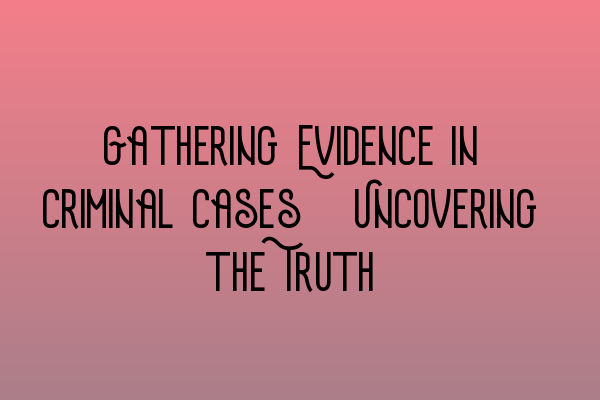Gathering Evidence in Criminal Cases: Uncovering the Truth
When it comes to criminal cases, gathering evidence is crucial to uncovering the truth. Evidence plays a critical role in determining the guilt or innocence of the accused, which is why it is important to understand the process of gathering evidence in criminal cases.
In this article, we will explore the different methods and techniques used to gather evidence, as well as the importance of reliable and admissible evidence in the criminal justice system.
The Types of Evidence in Criminal Cases
Before diving into the process of gathering evidence, it is essential to understand the different types of evidence that can be used in criminal cases. These types include:
- Direct Evidence: This type of evidence directly proves or disproves a fact. It includes eyewitness testimonies, confessions, and documentary evidence such as photographs or videos.
- Circumstantial Evidence: Unlike direct evidence, circumstantial evidence relies on inference to establish a fact. It includes things like fingerprints, DNA samples, or footprints found at the crime scene.
- Exculpatory Evidence: Exculpatory evidence is any evidence that tends to prove the innocence of the accused. It can include alibis, surveillance footage, or witness statements contradicting the prosecution’s case.
Understanding these different types of evidence helps legal professionals in determining the right approach when gathering evidence in criminal cases.
The Process of Gathering Evidence
Now that we have an understanding of the types of evidence, let’s delve into the process of gathering evidence in criminal cases:
- Crime Scene Investigation: The first step is securing the crime scene and conducting a thorough investigation. This involves documenting and collecting any physical evidence, taking photographs, and interviewing witnesses.
- Witness Interviews: Interviewing witnesses is a crucial part of gathering evidence. Witness testimonies can provide valuable insight into the events leading up to the crime, and potentially identify the perpetrator.
- Forensic Analysis: Forensic analysis involves the examination of physical evidence using scientific techniques. This can include fingerprint analysis, DNA testing, ballistics analysis, and more.
- Surveillance and Electronic Evidence: In today’s digital age, surveillance footage and electronic evidence often play a significant role in criminal investigations. This can include CCTV footage, phone records, emails, or social media posts.
- Expert Witnesses: In some cases, expert witnesses may be called upon to provide specialized knowledge or analysis. This could be in areas such as forensic science, psychology, or digital forensics.
By following this systematic process, legal professionals can gather a comprehensive range of evidence to build a strong case for their clients.
The Importance of Reliable and Admissible Evidence
In the criminal justice system, reliable and admissible evidence is essential. Without it, a case may fall apart, potentially leading to an unjust outcome. It is crucial to ensure that the evidence gathered meets the following criteria:
- Relevance: The evidence must be relevant to the case at hand. It should directly address the issues being disputed.
- Authenticity: The evidence must be genuine and not tampered with. Proper chain of custody should be maintained to establish its authenticity.
- Reliability: The evidence should be reliable and accurate. This can be established through expert testimonies or scientific analysis.
- Admissibility: The evidence must meet the legal requirements for admissibility. It should not be obtained through illegal means or violate the accused’s rights.
Legal professionals must have a keen eye for identifying reliable and admissible evidence. This ensures fairness and integrity in the criminal justice system.
Conclusion
Gathering evidence in criminal cases is a meticulous and vital process. It requires attention to detail, systematic investigation, and adherence to legal standards. By understanding the types of evidence, following the proper process, and ensuring the reliability and admissibility of the evidence, legal professionals can uncover the truth and contribute to the pursuit of justice.
If you want to enhance your knowledge and expertise in criminal practice, we offer workshops and seminars that can further expand your skills. Also, check out our articles on updates in UK criminal laws and enhancing your SQE criminal law study group experience for more valuable insights.
